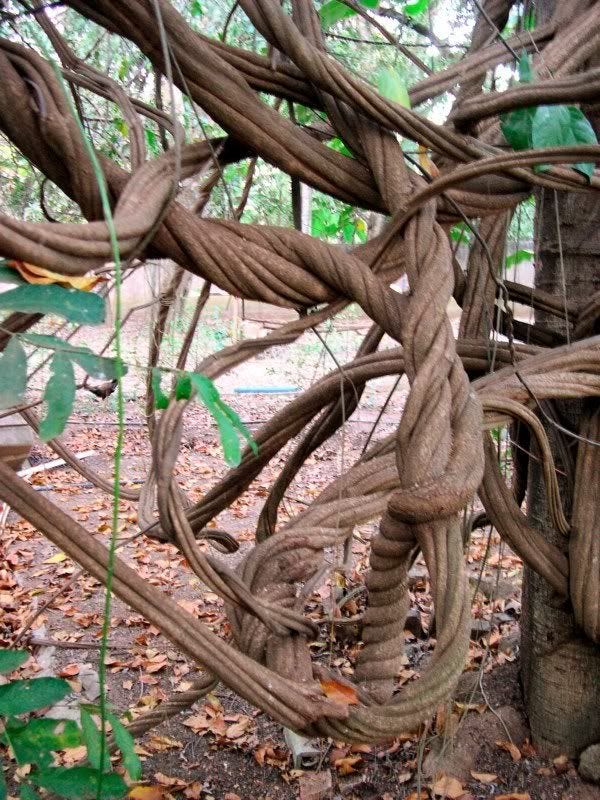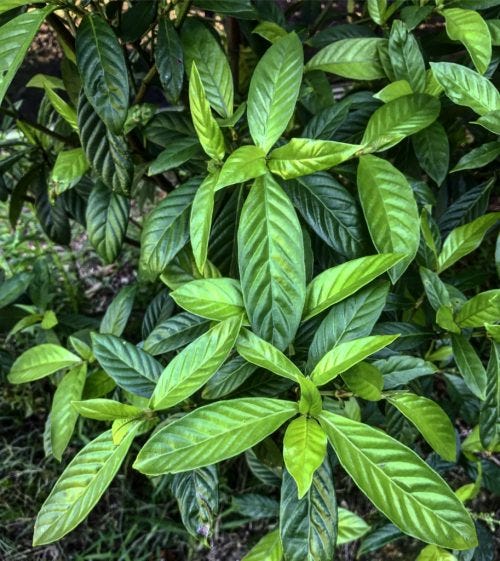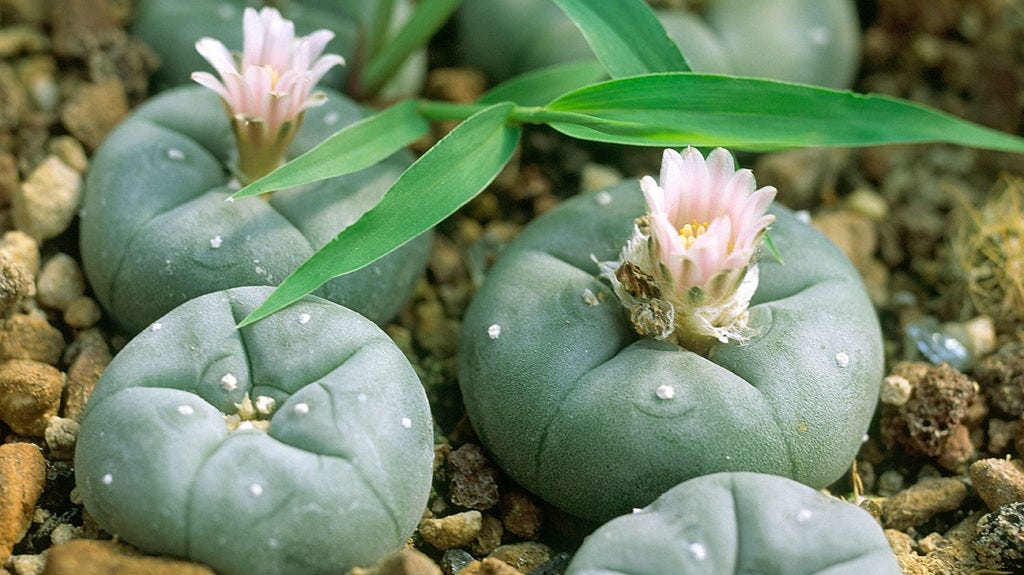Ayahuasca use in Portland, OR: my take on recent legislation
A deep dive on Portland's charter amendment decriminalizing psychedelic plant medicines
Welcome to the 9 people who joined Musings on Awareness since my last post (this community is 50 people strong)! If you haven’t yet subscribed, click the button to do the thing :)
We hit a milestone, y’all! I’d like to give a special thank you and shoutout to the first 50 subscribers to Musings on Awareness. It brings me so much joy to share my thoughts with all of you — I’m truly grateful for your readership and support! 🙏
The other day, my curiosity drove me to enter a couple of words in Google Scholar to see how many results would be returned:
“Alcohol” → 4.1M
“Cannabis” → 903K
“Psilocybin” → 30K
“Ayahuasca” → 27K
Not to discount the value of the current body of knowledge around centipedes, but it turns out we know more about these critters than we do about psilocybin or ayahuasca, at least as measured by Western clinical research approaches (“centipede” returned 40K results).
While Western science has estimated that humans first used ayahuasca 1,000 years ago, according to indigenous groups in the Amazon, its use in religious rituals has been passed down over 5,000 years. Surely, the localized use of the plant is one of the reasons the formal study of ayahuasca has been limited in the US in particular, another being that the active ingredient in ayahuasca — DMT — is a Schedule I drug, defined as a drug with no currently accepted medical use and a high potential for abuse, like LSD and cannabis (🙄).
Interestingly enough, the building blocks of ayahuasca — the physical stems of the tropical vine Banisteriopsis caapi and the leaves of the chacruna plant Psychotria viridis — aren’t explicitly illegal in the US. However, because they contain DMT — and because creating a decoction with them produces a drinkable liquid containing a concentrated form of DMT — it is illegal to possess them, at least at the federal level (please don’t consider this legal advice!). However, just as the US saw with cannabis, there is a parallel legislative and judicial framework forming in opposition to federal law that permits the personal use of ayahuasca and other natural plant psychedelics at the state and city level. Let’s take a closer look at the most recent amendment that the City of Portland made to its charter, copied wholesale below and accompanied by my own selective commentary.
City of Portland Charter Amendment: Decriminalization of Natural Psychedelics
Whereas, the people of City of Portland find that:
The possession and personal use of psychedelic plant medicines, defined herein as the Schedule I(d) plant and fungi containing therapeutic and natural psychedelic compounds, have been unjustly and immorally criminalized since the Nixon Administration.
True. Strict regulatory measures, like the 1970 Controlled Substances Act, functioned to impede research (unjust), which was a reaction to the stigmatization more than actual risks of the drugs themselves (immoral).
Natural medicines and the plants of the Earth should be a common treasury for all humankind and should remain accessible to all regardless of race, orientation, gender, and class.
This brings to mind what we’ve seen in the cannabis industry, which is the corporate establishment developing and patenting synthetic compounds to build an intellectual property portfolio and subsequent defensibility of their business in their pursuit of market share and profits, neither of which are inherently bad, but which present barriers to access nevertheless. Natural medicines and plants are inherently difficult to bring under existing medical practice frameworks and regulations specifically because the modern framework requires clinical trials to prove safety and efficacy, and it’s challenging to standardize the manufacturing and subsequent dosing of naturally occurring compounds in plants.
The principles of “cognitive liberty” and “bodily autonomy” endow all human beings with the inalienable right to freedom of thought within their own minds, as well as the freedom to ingest whatever they wish as long as it does not harm others.
AMEN.
Making these medicines available only through government-licensed facilities or health care centers in a country in which healthcare is a for-profit industry will create barriers to access for the most vulnerable and in-need populations.
I agree. Perhaps these medicines shouldn’t be brought into our modern medical system at all, at least not in its current form. After all, we would just be doubling down on an already fragmented system that lacks patient-centeredness where healthcare services are either too far away (geographical barrier), poorly delivered (organizational barrier), too expensive (financial barrier) or incongruent with culture and gender preferences (cultural barrier).1
Substance abuse, addiction, recidivism, trauma, post-traumatic stress symptoms, chronic depression, severe anxiety, end-of-life anxiety, grief, diabetes, cluster headaches, and other conditions are plaguing our community, and the use of psychedelic plants has been shown to be beneficial to the health and well-being of individuals and communities in addressing these afflictions via scientific and clinical studies and within continuing traditional practices, which can catalyze profound experiences of personal and spiritual growth.
There are many peer-reviewed clinical research articles that provide evidence for the benefit of psychedelic plants, particularly with respect to ayahuasca. For example, in one study from Barbosa et al, subjects who consumed ayahuasca showed “improvement of mental health, and a change in attitude towards more confidence and optimism” as well as “significant decrease in physical pain, and attitude change towards more independence”. In another study from Bouso et al, compared to non-users “ayahuasca users…scored significantly lower on all psychopathology measures, showed better performance on the Stroop test, the Wisconsin Card Sorting Test and the Letter-Number Sequencing task…, and better scores on the Frontal Systems Behavior Scale. Analysis of life attitudes showed higher scores on the Spiritual Orientation Inventory, the Purpose in Life Test and the Psychosocial Well-Being test”.
The governor of Oregon has declared addiction to be a public health crisis in this state.
Oregon ranks ninth for the state with the highest drug use in the US. Notably, it ranks #2 and #3 for the highest percentage of adult and teenage drug use, respectively. Despite DMT’s designation as a Schedule I drug, it has not been shown to be addictive in any published research. In fact, "significant reductions of dependence symptoms or substance use” has been shown in numerous human clinical studies and “improvement of biochemical or behavioral parameters related to drug-induced disorders” in all animal studies to date.2 Thus, DMT and ayahuasca are valid alternatives to treat addiction.
Practices with psychedelic plants have long existed and have been considered to be sacred to human cultures and human interrelationships with nature for thousands of years and continue to be enhanced and improved to this day by religious and spiritual leaders, practicing professionals, mentors, and healers throughout the world, many of whom have been forced underground and have been put in fear of arrest and prosecution.
Fear is a powerful force that has been weaponized for various means and to various ends for millennia. It’s time to change that, and it’s exciting to see Oregon set the example and pave this path forward.
The psychedelic plant practices of certain groups are already explicitly protected in the United States under the doctrine of religious freedom.
The psychedelic plant practices around mescaline containing cacti and Ayahuasca are already protected in Oregon under the doctrine of religious freedom.
The United Nations considers psychedelic plant material used for ritual purposes as excluded from government prohibitions.
#8 references the US Supreme Court case Gonzales v. O Centro Espírita Beneficente União do Vegetal (UDV). The UDV is a religious group that uses ayahuasca in their ceremonial tea as part of their religious sacrament and practice. In 1999, the FBI intercepted and seized a shipment of ayahuasca from Brazil en route to the UDV's New Mexico branch and eventually raided the UDV headquarters in Sante Fe. The UDV sued the Drug Enforcement Administration, the U.S. Customs Service, and the United States Department of Justice for violations of the First Amendment to the U.S. Constitution and The Religious Freedom Restoration Act, and they won. You can read more about the court case on UDV’s website.
Psychedelic plants containing ibogaine have been shown to alleviate treatment-resistance cases of opiate and methamphetamine addiction at significantly higher rates than all other treatments for addiction.
Ibogaine is reported to be beneficial for addiction therapy related to specific work-related PTSD encountered by first responders such as EMT, police, and firefighters, as well as military veterans.
Specifically, ibogaine functions to evoke and reprocess trauma, including memories, and can also bring about visions of spiritual and autobiographical content, which is highly relevant for people working through PTSD-related trauma.3
Psychedelic plants or combinations of plants such as Ayahuasca that contain forms of DMT, a naturally occurring compound in the human body that is listed as a Schedule 1 substance, can lead to experiences that are reported as mystical or experientially similar to near death experiences that can be demonstrably beneficial in treating addiction, depression and PTSD and in catalyzing profound experiences of personal and spiritual growth.
Read about this person and this person’s experience.
Psychedelic cacti that contain phenethylamine compounds such as mescaline, can be beneficial in healing drug and alcohol addiction and for individual spiritual growth and have been utilized in sacred initiation and community healing by diverse religious and cultural traditions for millennia and continue in use as religious sacraments in modern times.
The Native American Church is a Native American religion that uses peyote for medicinal, spiritual, and healing purposes.
Psilocybin, naturally occurring in certain mushroom species, can alleviate end-of-life anxiety for hospice and terminal cancer patients, can reduce prison recidivism, and can effectively treat substance abuse, depression, and cluster headaches.
This has been evidenced in numerous studies. Linked here is Ross et al’s study in which 60-80% of study participants with life-threatening cancer who took psilocybin continued to show clinically significant reductions in depression and anxiety at the 6.5 month follow up.
A Johns Hopkins University study on “healthy-normals” found that psilocybin can occasion mystical-type experiences, which were considered one of the top five most meaningful experiences in a subject’s life for over 75% of their subjects within the first year after the study, and found continuing positive life-style changes after a 14-month follow-up.
Examples of mystical-type experiences include:
Complete obliteration of the sense of self; fundamentally, “you” don’t exist
Absolute oneness and inexorable connection with the fabric of consciousness
Infinite, deep, and profound love for all sentient beings
Experiencing your birth, or re-birth
Time and dates cease to exist
Scarcity isn’t reality, rather, it’s a concept or perception
The City of Portland wishes to declare its desire not to expend City resources in any investigation, detention, arrest, or prosecution arising out of alleged violations of state and federal law regarding the use of psychedelic plants.
🍄🍄🍄
Like Portland, a few more locations in the US have decriminalized possession and personal use of ayahuasca, though its sale and distribution remains illegal in all jurisdictions. These locations include:
Oakland, CA and Santa Cruz, CA
Ann Arbor, MI and Washtenaw County, MI
Washington, DC
Somerville, Cambridge, and Northampton, MA
2023 will be a big year for Oregon and psychedelics, namely, psilocybin — the state will start accepting applications for licensure on January 2, 2023, including service center licensing, manufacturer licensing, and laboratory testing licensing, as well as training program curriculum approval. I’m excited to stay up to date and hopeful to see how a millennia’s worth of tradition and respect for the plant — first with psilocybin and then hopefully with ayahuasca — will be preserved and integrated with our current incarnation of Western medicine.
https://www.who.int/publications/i/item/9789241506096
https://www.tandfonline.com/doi/abs/10.1080/02791072.2016.1188225
https://www.ncbi.nlm.nih.gov/pmc/articles/PMC7359647/#:~:text=During%20treatment%2C%20ibogaine%20allows%20the,addressing%20PTSD%2Drelated%20psychological%20content.







